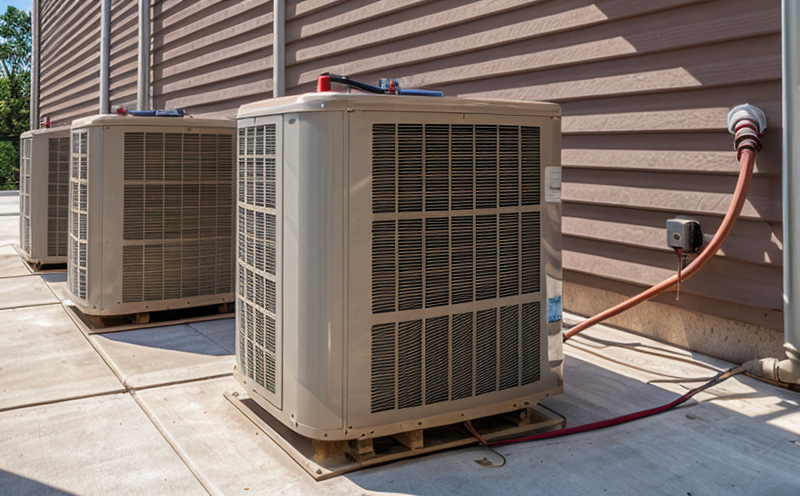EN 14511 Testing of Air Conditioners and Heat Pumps
The EN 14511 standard is one of the most stringent tests for air conditioners and heat pumps in Europe. Compliance with this standard ensures that HVAC systems meet rigorous performance, safety, and efficiency criteria set by European legislation.
EN 14511 covers a wide range of tests designed to evaluate the operational parameters of air conditioning units and heat pumps under various conditions. This includes energy consumption, noise levels, refrigerant recovery, and system performance in different ambient temperatures.
The standard also addresses the safety aspects of these systems by ensuring that they do not pose any risks to the users or the environment. Compliance with EN 14511 is mandatory for all air conditioning units and heat pumps sold within Europe, making it a critical requirement for manufacturers and importers alike.
Manufacturers must ensure their products pass this comprehensive test before entering the European market. This not only guarantees compliance but also helps in maintaining high standards of quality and reliability. The testing process involves rigorous evaluation of various performance metrics under controlled conditions to ensure consistent results across different units.
The EN 14511 standard is applicable to all types of air conditioners, including central systems, split units, packaged terminals, and heat pumps with refrigerant capacities up to 80 kW. It covers both the indoor and outdoor components of these systems.
Compliance testing typically involves several stages, including initial inspection, performance testing under different environmental conditions, refrigerant handling checks, and final verification. Each stage is critical in ensuring that the equipment meets all specified criteria.
Manufacturers should be aware that non-compliance can result in significant penalties, including fines and potential recalls of products already on the market. To avoid these issues, it is essential to work with a reputable laboratory that specializes in HVAC testing.
In summary, EN 14511 testing ensures that air conditioners and heat pumps meet stringent European standards for performance, safety, and efficiency. This not only facilitates easier access to the European market but also enhances brand reputation by demonstrating commitment to quality and sustainability.
Why Choose This Test
The EN 14511 test is a comprehensive evaluation that covers multiple aspects of air conditioner and heat pump performance. It ensures that these systems not only meet but exceed the stringent requirements set by European regulations, thereby enhancing their reliability and safety.
- Energy Efficiency: The test evaluates how efficiently an air conditioner or heat pump uses energy, ensuring minimal wastage and lower operational costs.
- Safety Standards: Compliance checks ensure that there are no hazards associated with using these systems. This includes testing for leaks in refrigerant lines and verifying the integrity of electrical components.
- Environmental Impact: By focusing on efficient operation, EN 14511 helps reduce carbon footprints and promotes sustainable practices within the HVAC industry.
- Market Access: Meeting this standard opens doors to the lucrative European market, which represents a significant portion of global sales for HVAC products.
- Quality Assurance: Regular testing ensures consistent performance across all units produced by manufacturers, enhancing overall product quality.
Choosing EN 14511 testing offers numerous benefits that go beyond mere compliance. It provides assurance to customers and stakeholders about the reliability and safety of HVAC systems while also contributing positively towards environmental goals.
International Acceptance and Recognition
- European Union (EU): EN 14511 is mandatory for all air conditioners and heat pumps sold within the EU, ensuring uniformity in product quality across member states.
- British Standards Institution (BSI): The UK follows this standard closely due to its alignment with European directives.
- International Organization for Standardization (ISO): While not directly applicable, EN 14511 aligns well with ISO standards on energy efficiency and environmental protection.
- American Society of Heating, Refrigerating and Air-Conditioning Engineers (ASHRAE): Although ASHRAE focuses primarily on North American markets, its guidelines can complement European standards like EN 14511 for a broader international perspective.
- Certification Authorities: Numerous certification bodies recognize the importance of EN 14511, offering additional layers of assurance to buyers and regulators alike.
The widespread acceptance of EN 14511 across various regions underscores its significance in the HVAC industry. Manufacturers who comply with this standard benefit from a broader customer base and increased market share.
Environmental and Sustainability Contributions
Compliance with EN 14511 plays a crucial role in promoting environmental sustainability within the HVAC sector. By ensuring efficient energy use, reduced refrigerant emissions, and enhanced system reliability, this standard contributes significantly to minimizing the industry's carbon footprint.
The test focuses on several key areas that contribute positively to environmental conservation:
- Energy Efficiency: High-efficiency systems consume less electricity, leading to lower greenhouse gas emissions. This is particularly important in large buildings where HVAC systems operate continuously.
- Refrigerant Management: Proper handling and recovery of refrigerants help prevent their release into the atmosphere, which would otherwise contribute to ozone depletion and global warming.
- Safety Features: Ensuring that systems are safe reduces the risk of accidents or malfunctions that could lead to waste or contamination.
Beyond these immediate benefits, compliance with EN 14511 encourages continuous improvement in product design and manufacturing processes. This shift towards more sustainable practices not only helps individual companies but also contributes to broader societal goals.
By prioritizing sustainability through rigorous testing like EN 14511, the HVAC industry can play a pivotal role in addressing global challenges such as climate change and resource depletion.





